Science for Society
 Science4Society is a collection of science education activities, which focus on the contribution that science, design and technology can make to peace, social justice and environmental sustainability.
The project was set up to provide an alternative to activities funded by the arms and fossil fuel industries and is co-ordinated by Scientists for Global Responsibility.
Science4Society is a collection of science education activities, which focus on the contribution that science, design and technology can make to peace, social justice and environmental sustainability.
The project was set up to provide an alternative to activities funded by the arms and fossil fuel industries and is co-ordinated by Scientists for Global Responsibility.
Is it Counterproductive to Enlist Minors into the Army?
Rethinking Remembrance in Schools
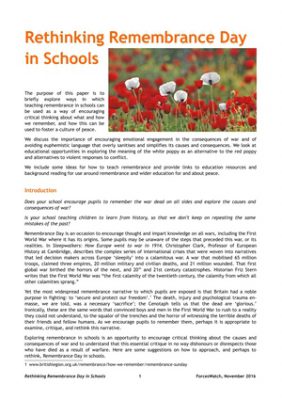 This paper, published by ForcesWatch, explores ways in which teaching remembrance in schools can be used as a way of encouraging critical thinking about what and how we remember, and how this can be used to foster a culture of peace.
This paper, published by ForcesWatch, explores ways in which teaching remembrance in schools can be used as a way of encouraging critical thinking about what and how we remember, and how this can be used to foster a culture of peace.
The Recruitment of Children by the UK Armed Forces: a Critique from Health Professionals
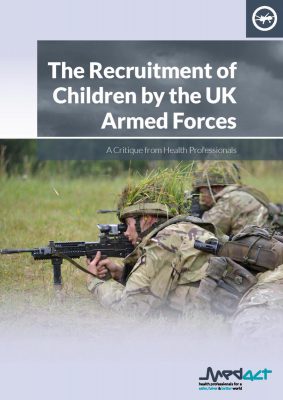 Medact’s report on the long-term impacts of the British military’s recruitment of children under the age of 18, presents evidence linking ‘serious health concerns’ with the policy, and calls for a rise in the minimum recruitment age. It looks at the psychological and psychosocial vulnerabilities of adolescents in the context of military recruitment marketing strategies and making long-term risky decisions and examines the evidence that under 18 recruits face greater risks to health than adult recruits, across the course of an armed forces career.
Medact’s report on the long-term impacts of the British military’s recruitment of children under the age of 18, presents evidence linking ‘serious health concerns’ with the policy, and calls for a rise in the minimum recruitment age. It looks at the psychological and psychosocial vulnerabilities of adolescents in the context of military recruitment marketing strategies and making long-term risky decisions and examines the evidence that under 18 recruits face greater risks to health than adult recruits, across the course of an armed forces career.
UN observations on UK and childrens’ rights
Soldiers at 16: Sifting fact from fiction
 Published by Child Soldiers International, this short and accessible booklet addresses questions often raised about under-18s in the armed forces, presenting the facts - based on extensive research - rather than the fiction. Also contains very useful quotes and statistics. Great when talking to your MP or for those thinking of enlisting!
Published by Child Soldiers International, this short and accessible booklet addresses questions often raised about under-18s in the armed forces, presenting the facts - based on extensive research - rather than the fiction. Also contains very useful quotes and statistics. Great when talking to your MP or for those thinking of enlisting!
The British armed forces: Why parental consent safeguards are inadequate
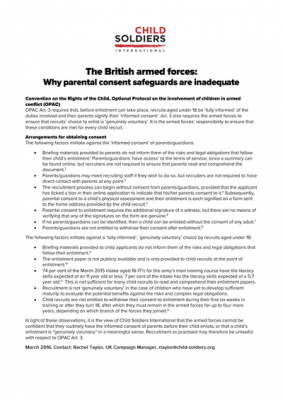 This briefing from Child Soldiers International explains why the armed forces cannot be confident that they routinely have the informed consent of parents before their child enlists, or that a child’s enlistment is “genuinely voluntary” in a meaningful sense.
This briefing from Child Soldiers International explains why the armed forces cannot be confident that they routinely have the informed consent of parents before their child enlists, or that a child’s enlistment is “genuinely voluntary” in a meaningful sense.
‘Commonsense and Understanding’: Recommendations from the Defence Committee’s Duty of Care report that are still outstanding 10 years on
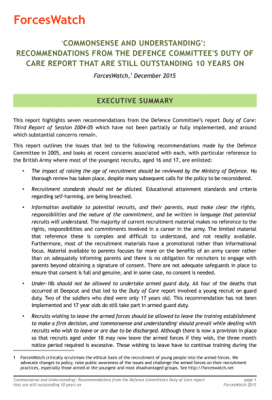 This report highlights seven recommendations from the Defence Committee’s report Duty of Care: Third Report of Session 2004-05 which have not been partially or fully implemented, and around which substantial concerns remain.
This report highlights seven recommendations from the Defence Committee’s report Duty of Care: Third Report of Session 2004-05 which have not been partially or fully implemented, and around which substantial concerns remain.
This report then discusses the concept of 'in loco parentis' and 'moral obligation' with regard to the army's duty of care towards young recruits, noting that the Defence Committee were concerned in 2005 that the MoD distinguished too rigidly between legal and moral obligations, with the latter as less important.
In 2005, the Defence Committee discussed the lack of balance beween training needs and considerations for operational effectiveness, and thus made its recommendations. Ten years on, it is apparent that operational arguments, and current difficulties meeting recruiting targets, continue to prevent the armed forces from reviewing both their position on enlisting under-18s, and their recruitment practices and materials.
Peace education and the promotion of the armed forces in UK schools
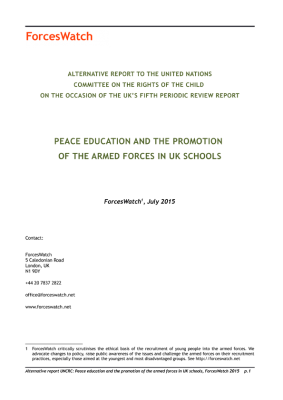 This report highlights that peace education is not being promoted in schools. This is counter to the recommendations made by the United Nations Committee on the Rights of the Child to the UK Government that peace education should be part of the curriculum.
This raises concerns particularly with the increased promotion of the military within schools through the Department for Education's 'military ethos' programme and free military-related learning resources, and as the armed forces continue to conduct a substantial 'youth engagement' programme.
This report highlights that peace education is not being promoted in schools. This is counter to the recommendations made by the United Nations Committee on the Rights of the Child to the UK Government that peace education should be part of the curriculum.
This raises concerns particularly with the increased promotion of the military within schools through the Department for Education's 'military ethos' programme and free military-related learning resources, and as the armed forces continue to conduct a substantial 'youth engagement' programme.
Concerns about armed forces visits to secondary schools in Wales
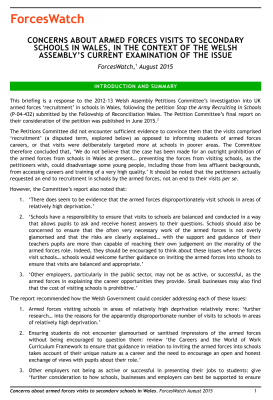 This briefing is a response to the 2012-13 Welsh Assembly Petitions Committee’s investigation into UK armed forces ‘recruitment’ in schools in Wales, following the petition Stop the Army Recruiting in Schools (P-04-432) submitted by the Fellowship of Reconciliation Wales. The Petition Committee’s final report on their consideration of the petition was published in June 2015.
This briefing is a response to the 2012-13 Welsh Assembly Petitions Committee’s investigation into UK armed forces ‘recruitment’ in schools in Wales, following the petition Stop the Army Recruiting in Schools (P-04-432) submitted by the Fellowship of Reconciliation Wales. The Petition Committee’s final report on their consideration of the petition was published in June 2015.
The Unseen March
The recruitment agenda behind the UK armed forces’ ‘engagement’ with students in schools and colleges
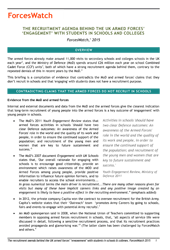
This briefing is a compilation of evidence that contradicts the MoD and armed forces' claims that they don’t recruit in schools and that 'engaging' with students does not have a recruitment purpose.
UK’s compliance with the UN Convention on the Rights of the Child: Report from the Joint Committee on Human Rights
Armed Forces Visits to Secondary Schools in Scotland
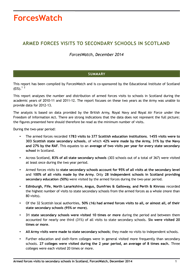 The report, compiled by ForcesWatch, is based on figures obtained under the Freedom of Information Act from the armed forces on their visits to Scottish schools. It has been co-sponsored by the Educational Institute of Scotland which has expressed concerns that some armed forces visits may have a recruitment purpose.
Also see Armed forces visits to schools in Scotland: An update for 2016-2017
The report, compiled by ForcesWatch, is based on figures obtained under the Freedom of Information Act from the armed forces on their visits to Scottish schools. It has been co-sponsored by the Educational Institute of Scotland which has expressed concerns that some armed forces visits may have a recruitment purpose.
Also see Armed forces visits to schools in Scotland: An update for 2016-2017
How ought war to be remembered in schools
 David Aldridge examines the reasons usually advanced for involving children and young people in commemorating the war dead, and finds many of them wanting. He critically examines the high profile in schools of charities, like the Royal British Legion, with vested interests in certain kinds of commemoration. And he argues forcefully for a justification of remembrance in schools that requires a major rethink of established rituals and practices.
David Aldridge examines the reasons usually advanced for involving children and young people in commemorating the war dead, and finds many of them wanting. He critically examines the high profile in schools of charities, like the Royal British Legion, with vested interests in certain kinds of commemoration. And he argues forcefully for a justification of remembrance in schools that requires a major rethink of established rituals and practices.

